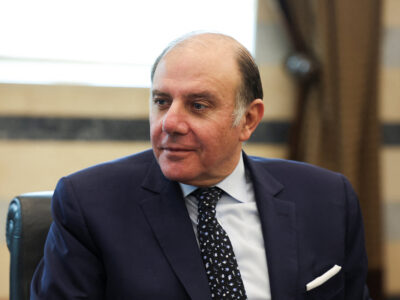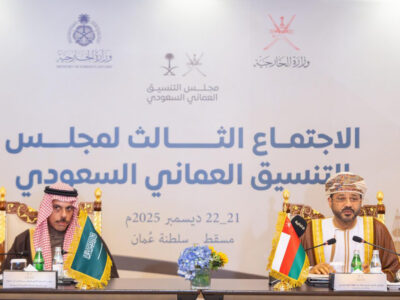Saudi Arabia’s Prince Mohammed Bin Salman Al Saud traversed Asia last week in a bid to revive the kingdom’s economic transformation amid chilly relations with the West.
The crown prince arrived in Beijing following visits to Pakistan and India, showing the world that his country still has allies.
It is difficult to imagine a more fulsome welcome from the Eastern mega giants. The gift that Prince Mohammed received in Pakistan – a golden gun – was a portent of the equally shiny praise the Saudi leader would receive from the highest echelons of Asian power throughout his six-day tour.
In India, Prince Mohammed described Prime Minister Navendra Modi as his “elder brother” and officials talked of an “even stronger relationship” in the future.
In China, President Xi waxed lyrical: “China is a good friend and partner to Saudi Arabia,” Asia’s most powerful man trilled.
Multi-billion dollar deals
And if the glowing social largesse was notable, the figures being bandied about were even more staggering.
The kingdom committed to deals worth $100bn in India, $11bn of that on a massive petrochemical project. Saudi Arabia also clinched a $10bn oil deal with China, the kingdom’s largest trading partner.
The crown prince’s reported pledge of $20bn investment to Pakistan likely came as a relief to a country seeking its 13th International Monetary Fund (IMF) bailout since independence after another economic meltdown.
All these rapid-fire economic and political endorsements sent an unassailable message to the GCC region and the West – “you may have chastised us but we still have powerful friends and allies.”
According to Wes Schwalje, COO of Dubai-based research firm Tahseen Consulting: “This foreign policy shift is an acknowledgment of the growing influence of countries like China, India, and Pakistan in global politics.
“In terms of diversifying bilateral Saudi relations to reduce reliance on historical geopolitical power brokers, Saudi Arabia’s pivot towards Asia is still a work in process.
Prince Mohammed is not just looking after his oil partners but he is looking at huge economic transformation and that means connecting the Middle East and Asia
“Prince Mohammed’s Asia tour is part of a broader geopolitical pivot towards Asia that was begun under the former King Abdullah Bin Abdulaziz Al Saud.”
However, Dr Neil Quilliam, senior research fellow at London-based think tank Chatham House, said the “pivot” could be less substantial than it appears.
“The Saudis don’t want to pivot to East, there is no pivot, but they’re happy that the media and analysts have suggested that Prince Mohammed is pivoting East,” he told Arabian Business.
Hard to measure
Quilliam said that Prince Mohammed’s opulent whistle-stop Asia tour could be seen to “put pressure” on Western governments to adjust their position.
“However, in practice, relations between KSA and the West remain strong; in the meantime, Saudi economic relations with Asia are growing, but that is not new and Prince Mohammed’s visit is one of many made by senior Saudis since 2013,” he said.
The think tank expert said it is always “hard to measure” the real success of such visits.
Quilliam said: “On the whole, they are presented as successes, especially when leaders are greeted with such fanfare. It certainly grabbed the headlines and sent a message – rightly or wrongly – that Prince Mohammed is pivoting towards Asia. However, as always, the proof of the pudding is in the eating. It remains to be seen as to whether the financial pledges materialise.”
Scott Lucas, professor of international politics at the UK’s University of Birmingham, told Arabian Business: “The crown prince is a very ambitious young man; he’s not just looking after his oil partners but he is looking at huge economic transformation and that means connecting the Middle East and Asia. The potential cooperation is vast.”
Lucas added: “Saudi Arabia sees the massive opportunity for economic gain and partner diversification, particularly as there is concern about Prince Mohammed being isolated or put under pressure by the West over the Khashoggi outcry.”
The professor added: “His warm reception in Asia plays to a regional and Western audience – ‘we have many allies’.”
Important year
However, the next year pans out in terms of the kingdom’s Western relations, China, India, and Pakistan will remain critically important to Saudi Arabia in geopolitical and economic terms, said Schwalje.
“China and India are two of the kingdom’s largest trading partners with the trade relationships currently focussed on serving energy demands,” he said.
“Right now, Saudi Arabia’s trade relationship with Asia is still dominated by energy demands. But as part of its diversification efforts under Vision 2030, we are beginning to see a gradual shift to transition trade and investment away from the extractive industries towards deals that involve infrastructure, alternative energy, technology, transportation, advanced manufacturing, tourism, and e-commerce.”
Geng Shuang, the spokesman for the Chinese Foreign Ministry said Prince Mohammed’s visit will add to a “positive momentum” in Chinese-Saudi cooperation.





